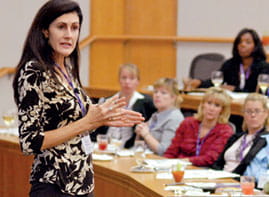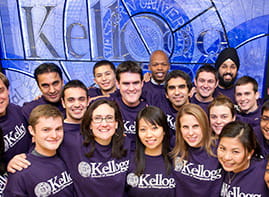In a panel discussion at the Kellogg School, business leaders reveal how their professional setbacks led to successful comebacks
6/15/2010 - In his farewell letter to his JetBlue Airways employees, David Neeleman wrote, “It’s not what happens to you, but how you deal with it.”
| |
 |
Related Video |
|
| |
| |
|
Neeleman was publically ousted in 2007 as CEO of JetBlue Airways, the company he founded, after an ice storm in the Northeast caused several of the company’s flights to be delayed on the tarmac.
Neeleman took his own words to heart, founding Azul Brazilian Airlines in 2008.
“You have to practice what you preach and go on to the next opportunity,” Neeleman said.
Neeleman is one of the leaders featured in the book
Comebacks: Powerful Lessons from Leaders Who Endured Setbacks and Recaptured Success on Their Terms (Jossey-Bass), by Andrea Redmond and Patricia Crisafulli. Six of the business leaders featured in the book participated in a May 27 panel discussion at the Kellogg School to share how they were able to re-position themselves after suffering career adversity.
In a talk moderated by Clinical Professor of Management & Organizations Michelle Buck, the leaders discussed how they moved ahead professionally after losing their dream jobs or recovering from a public scandal.
“Whether it’s a master plan or not, there are things you couldn’t have done without overcoming that crucible,” said Patricia Dunn, former chairman of the board at Hewlett-Packard. Dunn faced accusations related to corporate espionage, but was acquitted of all charges. During that time, Dunn was also battling a recurrence of ovarian cancer.
“To be in a leadership position …. takes fundamental optimism,” said Dunn, who now focuses on philanthropic activities. “You have to look at all the things that are going to go well versus the things that are going to go wrong.”
Other leaders said the setbacks, often in the form of a resignation or public scandal from their C-level or board positions, forced them to reevaluate their life. Christopher Galvin ’77, former CEO of Motorola, had known he wanted to be CEO of his family-founded company since he was 10 years old. When the board forced his resignation in 2004, Galvin felt like he was being separated from his family.
“The most terrifying thing was looking at a blank sheet of paper,” Galvin said. “I had to face reality and do a lot of soul-searching.”
Galvin recovered, founding Harrison Street Real Estate Capital with his brother and another partner in 2005, and applying the lessons he had learned over the course of his career to make his new company successful.
“Success is defined in the success of others,” Galvin said. “We define leadership as taking people elsewhere, somewhere they may not have gone otherwise. We never talked about being wealthy. That was the outcome of being successful.”
Another panelist, Harry Kraemer ’79, developed a life plan for himself after being forced to resign as former chairman and CEO at Baxter International. And he found other passions — teaching and private equity. Kraemer is a clinical professor of management and strategy at the Kellogg School and an executive partner at Madison Dearborn Partners in Chicago.
“Take the time to know yourself, know your values and goals,” Kraemer said. “Never let a job or position be who you are.”
Other panelists said they sought to do good for others.
Herbert Pug Winokur applied his experience as a former board member of the Enron Corp. to develop a nonprofit journalism watchdog organization after observing uneven media coverage during the company’s scandal. The Audit is a
Columbia Journalism Review blog that critiques and covers the business press and is an advocate for better business reporting.
“The hardest part was coming to the realization that it wasn’t about me at all,” Winokur said.
Another panelist, Dale Dawson, decided he wanted to pursue work on his own terms. Dawson had just sold TruckPro LP to AutoZone and completed a stint as head of investment banking for Stephens Inc., but was only in his late 40s.
“It was everything I always wanted, but I didn’t wake up excited,” he said.
Using the skills he learned in business, Dawson helped build a school in Rwanda and worked with a microfinance bank in developing countries.
“I wasn’t going to settle with a life without passion,” Dawson said.






